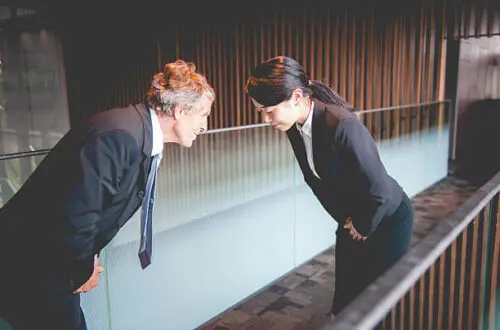
Thumbs Up Japan: Meaning of Hand Gestures in Japan
In Japan, people use a lot of hand gestures and most of them have a completely different meaning. And, if you do not want to offend your Japanese friend, you must know what these signs mean.
In Japan, thumbs up mean a sign of agreement. However, it also means ‘a lover’ in a rude way. If you want to stay clear of such confusion, you must find out what other hand gestures point to in Japan.
With an increase in global tourism, the number of foreigners visiting Japan has surged too. With that, the country has learned to welcome the difference of culture with an open heart. However, you must try not to offend the host when communicating in sign language. And, you will be using it too often. While English is understood by quite a lot of people in Japan, it is obvious to barge into someone, that does not. So, stay prepared and learn the sign language that could sail you through in the times of confusion.
Thumbs Up
Almost everyone knows what that means. A thumbs-up is a sign of affirmation and people use it in a good way. If someone in Japan shows you a thumbs up, it will mostly have the same meaning.
For instance, if you invite your Japanese friend for a movie and he gives you a thumbs up, it does mean that he would certainly accompany you. However, there is one more meaning attached to this hand gesture, you probably did not know about.
Thumbs up is also used for referring it to a Man. To be precise, it points to ‘boyfriend’, however, in a rude way. Hence, when next time your friend brings a boy along with her, do not show thumbs up. While you may be referring to a party, she may take it in a completely another way.
So, you must pay attention to the context while giving thumbs up. And, you would easily learn how to mingle among your Japanese counterparts.
Index Finger
Japanese are very determined individuals. And, they respect their culture. This is one of the reasons why they are still accustomed to their old gestures so intensely. And, they have quite a few variations for the index finger referring to completely different meanings.
When you use both your index finger at the sides of the head like horns, it means anger. While you may think you are trying to be funny, your Japanese friend would take it otherwise.
Moreover, if you put your index finger on the tip of your nose, that would mean you are referring to yourself. I understand, in most of the culture, including western region, we usually point towards our chest when talking about ourselves. But in Japan, people touch the tip of their nose in doing so.
Victory Sign

Japanese may use a completely different language. However, they use a lot of hand gestures to express meaningful opinions. And, if you learn a few of these signs, you may be able to get through the differing language barrier.
Victory sign is one of their most common hand gestures you would find people in Japan using often. The sign simply means peace. And, it became popular after Jun Inoue, a young pop singer, made the sign during his appearance for the Konica commercial.
Since then, you may find the sign in most of the photos clicked in Japan. And, it does bring positivity to the faces of the Japanese. The best way to tell your Japanese friend that you come in peace. It does show respect for their culture and could mean a lot of good things.
Hence, if you seem to be liking the company of your host in Japan, you can convey the message through a victory sign.
Fist Bump
Once again, an easy one to guess. The fist bump has almost the similar meaning across all cultures. Either it’s the USA or Japan, people use fist bump to show approval. Although people in Japan are used to high fiving, the fist bump isn’t from inside of the country. On the contrary, it is an adapted hand gesture from the western country that many hosts haven’t caught on yet.
The good news is that the hand gesture is easy to apprehend. Hence, even if the host is not aware of the same, he or she may get a hint of what you are pointing to. And, if not, you may expect confusing eyes wondering why you just showed them the ‘punch on the face’ sign.
But wait! There are other variations of the same.
If you clench your fist, but placed differently, it would have a completely different meaning. For instance, as mentioned above, if the clenched fist points forward, it would be similar to ‘High Five’. However, if you bring the fist closer to your face, in front of your nose while pinky-finger pointing outwards, it would refer to the Tengu’s nose. And, it’s an offensive gesture.
In case, you see someone clenching the fist and punching in the air while touching the bicep by the palm of the other hand, this means that the guy is up for every challenge. If you find a Japanese friend making such a gesture, do not take it otherwise. It is not about showing one’s superiority or aggression.
Pointing Finger
Being surrounded with water from all sides, Japan was shut off from the other parts of the world and their heritage for resulted in a completely unique culture that Japan owns today. Most of their hand gestures, hence, seem completely opposite of what we consider usual.
One such example is the pointing finger. We use our index finger to point to someone or the direction. However, if you walk through the passages in Japan and keep pointing to things or people, you may find a lot of rolling eyes latched at you.
Yes, Japanese are very strict about not humiliating or offending one another when in public. And, you are crossing the line when showing your index finger to your friend from Japan. You may be confused of all the burning stares at you, but they are for a reason.
So, remember not to point index finger when in Japan. Some may take it lightly considering you a foreigner. But at times, you may unknowingly put your friend in a tidy situation. As Japanese are not used to see an index finger pointing to them.
Middle Finger
If you have already started guessing the meaning of the middle finger, you may find it surprising that the results won’t match. In Japan, middle finger isn’t something profane. On the contrary, it has a completely normal meaning.
The people of Japan have names attached to the different fingers in our hands. If you have heard the rhyme, ‘finger family’, you would be able to connect the dots. And, if you have, you better know what does the middle finger refer to. Yes, its for the elder brother. When you show up one middle finger, it means ‘ani’ and pictured as 兄. The literal meaning of ani is ‘older brother’.
But it does not mean that the Japanese are not aware of the meaning that the western world holds for the middle finger. Thanks to popular western movies and music videos streaming in Japan. So, if you think you can get away after posing the middle finger in front of your Japanese mate, you may put yourself in a very awkward situation.
And, mind you, the Japanese could be very literal about your actions. So, it is better not to use the gesture for fun as well. This could offend your friend and you would lose a host while staying in a foreign land, forever.
Rolling Index Finger Towards your Thumb
It simply means good. We have been using this particular hand gesture for approving things. For instance, if you like someone’s changed hairstyle, you just curl your index finger to the thumb making a zero sign. And, it says it all.
However, things are different in Japan. The sign does not mean ‘good’ or ‘OK’. It refers to money. Hence, if you have no money to pay for an item and you cannot make the shop owner understand the same, you just show him the zero sign and shake your open hand in front of your face as if you are trying to chase away a fly. He will understand.
Thumbs Down

Do you just want to say that the food was bad, and take out your hand to give a thumbs down? You just offended your Japanese friend. Trust this, the sign does not mean a simple ‘NO’.
In Japan, Thumbs down is very similar to what the middle finger in the US means. It is a harsh statement meaning you wish the other person to go to hell.
And, as mentioned before, the Japanese take hand gestures too literally. While there are slim chances that your friend from Japan may understand what you just meant, it is better to be cautious.











